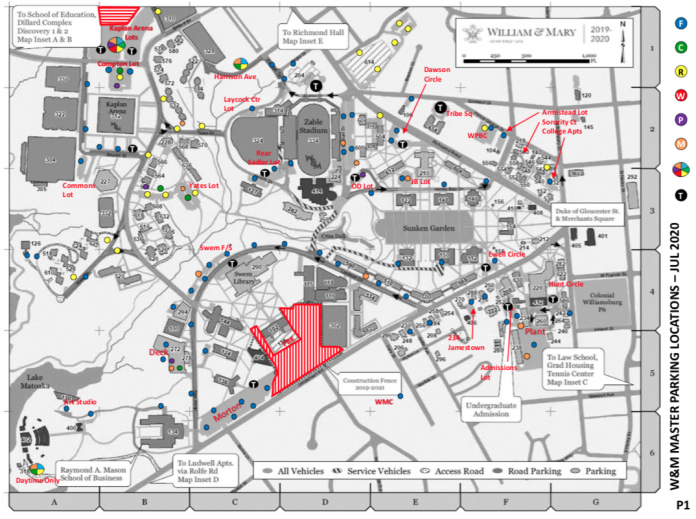One of the many changes occurring at the College of William and Mary for the fall semester is an array of updates to on-campus parking and transportation. A culmination of the 2013 and 2019 Walker Studies lead to the recent approval of various changes within parking by the Executive Leadership Team of the College.
Announced to students and staff via email and the College’s website, one of the most notable changes includes the reallocation of 154 total to visitor parking spots, including 25 spaces in the Morton Hall lot, 25 spaces in Dawson Circle, and 35 spaces in the Old Dominion Hall lot, all popular and often hotly contested parking spaces during the school year. These new visitor spaces will be managed through the Passport parking application, with additional in-person kiosks available for payment, and will also be used for departmental visitors and guests.
Along with these changes, other changes include a redesignation of the Zable Stadium lot from resident parking to solely faculty and staff parking. Additionally, residents in the Graduate Complex will no longer be permitted to utilize the second and third levels of the parking deck on Ukrop Way.
Tthe new changes also outline expanded in-house shuttle routes complementary to WATA’s Green Line service. Parking and Transportation aimed to create two shuttle lines that will best serve the College community by forming routes that accessed the most in-demand locations at peak times of use. The weekly late-night services will be discontinued; however, students at the College will still enjoy free service with their student identifications. The updated shuttle routes now include service from the Graduate Complex to the School of Education.
Daniel Speer ’22 recently accepted a position with the Parking Appeals Ccommittee and works for Parking and Transportation as a mobility driver. He is hopeful that the expanded service to the School of Education will encourage more students to buy Long-Term Storage decals and decrease the number of cars on the main campus of the College.
“No late-night service is going to hurt grads, even though it serves the Grad complex still”, Speer said. “I’m personally glad it will run to the School of Ed again, because I can ride it to the Lot 3 Long-Term storage lot if I have my car.”
“No late-night service is going to hurt grads, even though it serves the Grad complex still”, Speer said. “I’m personally glad it will run to the School of Ed again, because I can ride it to the Lot 3 Long-Term storage lot if I have my car.”
Parking and Transportation has a longstanding, often contentious relationship with the student body. Many students are raising concerns over the continuous decrease in available parking spots throughout campus, the costs of parking decals and accessibility issues. These recent changes have come with pushback from students —, especially on social media.
Joe Tapia ‘21 expressed his frustrations with Parking and Transportation on the College-related meme page,” Swampy Memes for Twampy Teens.” Tapia emailed William Horacio, director of Parking and Transportation services, inquiring about any planned discounts on parking decals as a result of the delayed move-in dates, and shared his frustration with the changes, as well as his negative experiences with on-campus parking in the past.
“My experience with parking echoes that of many other students’ experiences; there never seems to be enough priority for those students who desperately need vehicles,” Tapia said. “The current pricing model incentivizes students to not own vehicles, and punishes those with vehicles. Every aspect of campus life should further enhance the student experience, and in so many ways W&M fails at this.”
Director of Parking and Transportation services William Horacio described how thus far, these changes have been fairly well received. He explained how parking services throughout campus are continuing to evolve, and many changes are yet to come.
“This is only the first phase of a much more elaborate adjustment to the parking system,” Horacio said. “It is the most comprehensive change in over 25 years. The next phase aims to eliminate some practices that are not in line with the best use of the limited inventory of spaces, and ultimately we aim to restore an element of choice to our customers.”
“This is only the first phase of a much more elaborate adjustment to the parking system,” Horacio said. “It is the most comprehensive change in over 25 years. The next phase aims to eliminate some practices that are not in line with the best use of the limited inventory of spaces, and ultimately we aim to restore an element of choice to our customers.”
Horacio continued by stressesingstressing the financial support that is necessary from parking revenue. The various fees required for purchasing a parking pass is used for funding a variety of auxiliary services associated with the ColelgeCollege.
“Those choices also restore the value of parking back on the asset,” Horacio said. “It takes a significant amount of revenue to support our system and all of its components, when the value is based on convenience and choice, it is easier to stress this aspect rather than assign parking based on affiliations. We hope to have plenty of payment options and conventions so that most needs are met in the most affordable way while allowing the system to generate the revenue required to cover all costs, and have enough to build and improve when that is necessary.”
As most sophomore, junior, and senior students remain home until at least Labor Day, the on-campus parking capabilities will remain untested for the foreseeable future. Due to COVID-19 regulations, progress within parking and bus services has been slowed or paused to ensure safe practices.
“Service has been put on hold until we are able to transport fuller loads,” Horacio said. “Our COVID response posture only allows us to transport a maximum of 3 passengers. This limit renders the service inefficient and impractical to run at this time.”
.

































